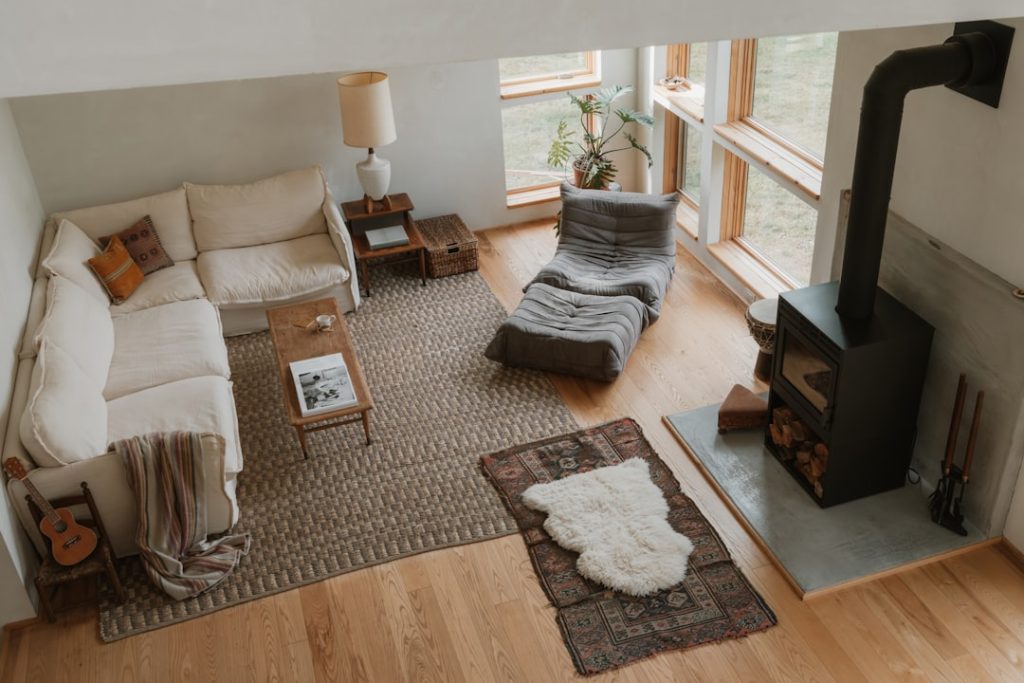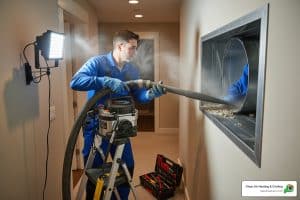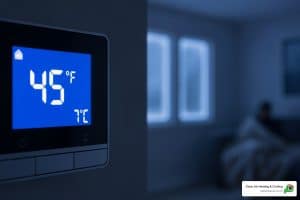Why Choosing the Right Heating System Matters
Choosing the right home heating solution is critical because it’s often the biggest energy expense in your house, accounting for nearly 29% of your utility bill. Here’s a quick look at your options:
Top Home Heating Solutions:
- Furnaces (Forced Air): The most common system, using ductwork to distribute heat from gas or electricity.
- Heat Pumps: The most efficient option, providing both heating and cooling by transferring heat.
- Radiant Heating: A luxury option that heats from the floor up, operating silently without ducts.
- Boilers with Radiators: A long-lasting system common in older homes that uses hot water.
Making a smart choice, combined with proper insulation, can save you up to 30% on energy costs. Most systems last 15-30 years, so it’s a long-term investment in your comfort and budget.
I’m Colin Matei, Owner of Clean Air Heating & Cooling. My team and I have spent years helping families in the Bellingham area find the perfect home heating solutions. Understanding your options is the first step toward lower bills and a more comfortable home.
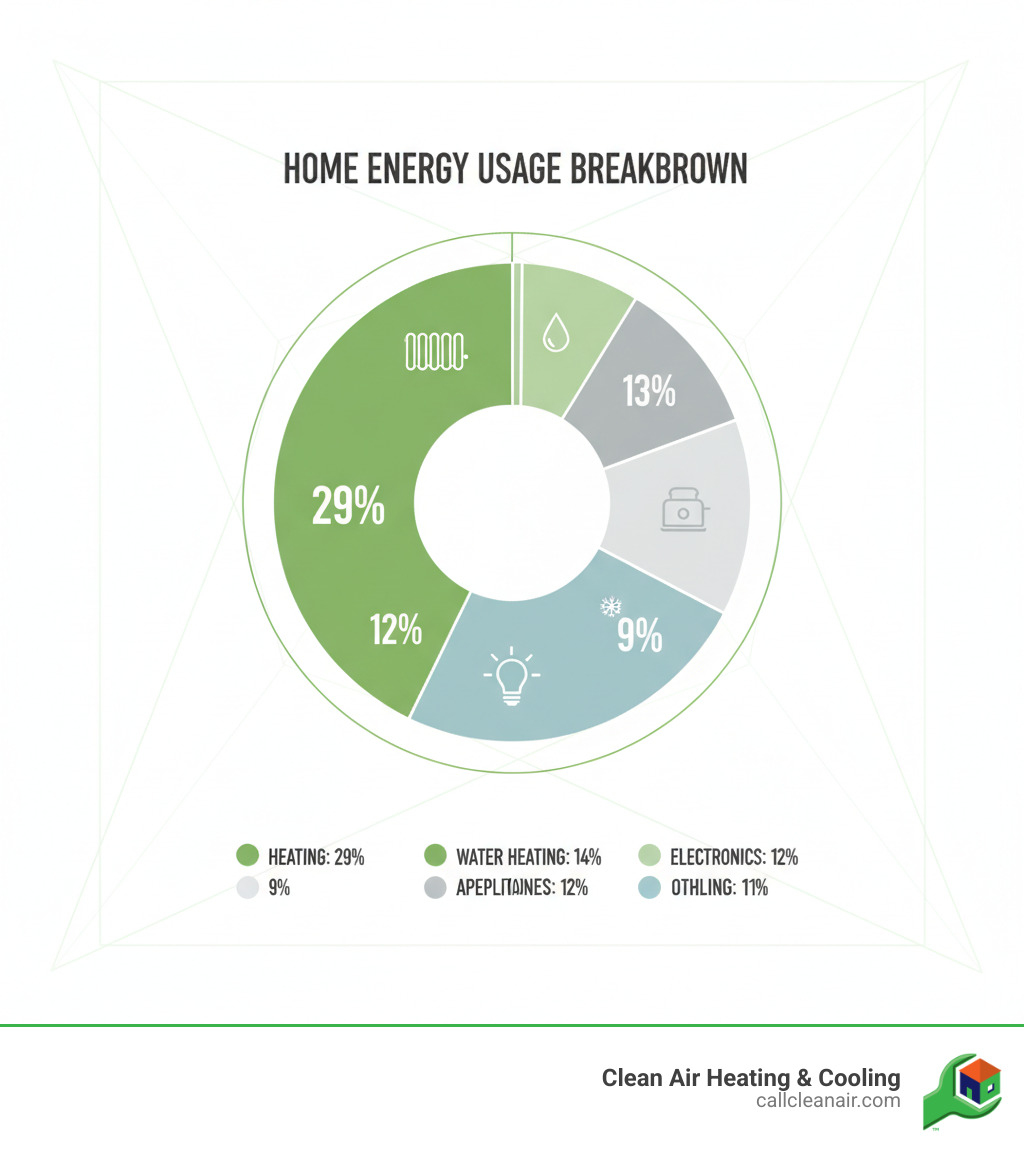
Ready to explore which heating system is right for your home? Let’s break down each option.
A Guide to Common Home Heating Solutions
Each home heating solution works differently, with unique costs and comfort profiles. Some blow warm air, others warm your floors, and some do both. You don’t need to be an HVAC expert to understand the basics. Let’s walk through the most common systems in Northwest Washington homes. For a deeper dive, the U.S. Department of Energy offers a helpful guide to heating systems.
Furnaces (Forced Air)

As the most common heating system in American homes, furnaces are a familiar sight in Whatcom, Skagit, and surrounding counties. A furnace pulls in cool air, heats it with a fuel source, and pushes the warm air through a network of ducts to every room. This system relies on ductwork, so if your home already has it, installation is more straightforward.
Furnaces can run on several fuels. Natural gas is the most popular and cost-effective choice where available. Electric furnaces are an option for all-electric homes, while oil or propane offer independence from utility lines in more rural areas.
Pros: Furnaces are typically affordable to install (with existing ducts), heat your home quickly, and are very reliable. They can also incorporate air filters to improve indoor air quality.
Cons: Leaky ductwork can waste energy and circulate dust. The system’s fan can be noisy, and uneven heating can occur if ducts aren’t balanced. Many furnaces also burn fossil fuels, contributing to greenhouse gas emissions.
Radiant Heating
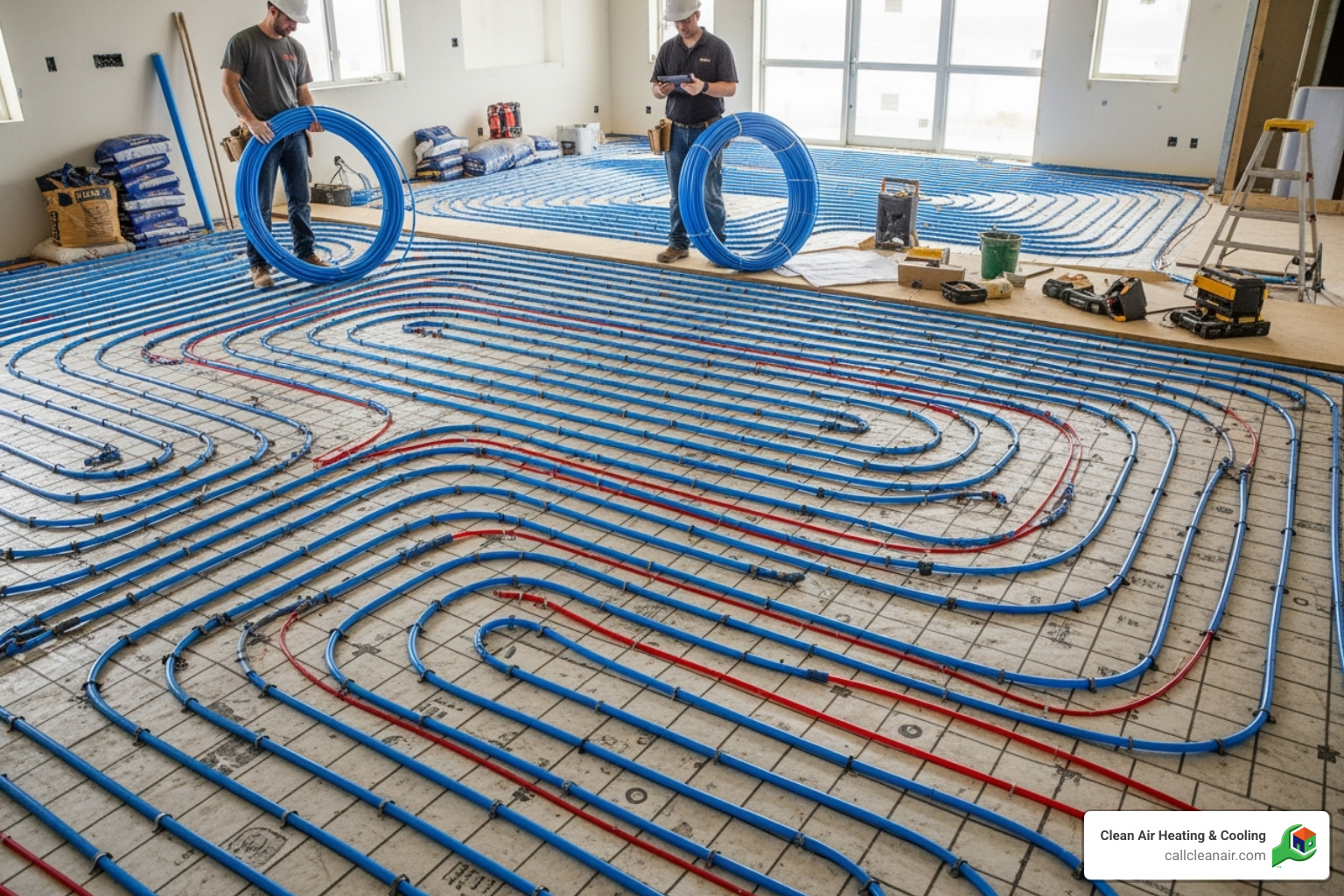
Radiant heating offers luxurious comfort by warming surfaces directly, much like the sun. Instead of blowing hot air, it turns your floor into a giant, gentle radiator that sends heat upward, creating an even, comfortable warmth.
The most common type, hydronic radiant heating, circulates hot water through tubes beneath the floor. It’s highly efficient and great for maintaining steady temperatures. We often help homeowners with Radiant Floor Heating Installation, and we’re always happy to discuss whether this system makes sense for your home. Electric radiant heating uses cables or mats, which is simpler to install and popular for smaller areas like bathrooms, but operating costs depend on local electricity rates. You can learn more about the investment from our guide on Heated Floors Installation Cost.
Pros: Radiant heat is completely silent, provides exceptionally even warmth, and doesn’t circulate allergens. It’s also energy-efficient and invisible, freeing up wall space.
Cons: The system is slower to respond to temperature changes. Upfront installation costs are higher, especially in existing homes, and repairs can be disruptive since the components are buried in the floor. It also only provides heat, requiring a separate system for cooling.
The Rise of the Heat Pump: An All-in-One Solution
Heat pumps are quickly becoming one of the smartest home heating solutions, especially in Northwest Washington. They are highly energy-efficient, provide both heating and cooling, and are better for the environment. Instead of burning fuel to create heat, a heat pump moves it from one place to another. In winter, it pulls heat from the outside air and brings it in; in summer, it reverses the process. This makes them far more efficient than traditional systems. As Natural Resources Canada explains in how a heat pump works, this process also dramatically reduces your home’s carbon footprint.
How Do Heat Pumps Work?
A heat pump works by transferring heat. Even on a cold day, there is heat energy in the outside air. The heat pump extracts this ambient heat and concentrates it inside your home. In summer, it reverses, pulling heat from your home and releasing it outdoors. This is accomplished through a refrigerant cycle, similar to how your refrigerator operates, but on a larger scale. A reversing valve switches the system between heating and cooling modes. Because they move heat rather than generate it, they are incredibly efficient—for every unit of electricity used, they can move three or more units of heat. Learn more in our guide, What are Heat Pumps? How Do They Work?.
Types of Heat Pumps

Different heat pumps suit different needs and budgets.
- Air-Source Heat Pumps: The most common type. They extract heat from the outdoor air. Modern cold-climate models work efficiently even in freezing temperatures, handling the vast majority of our region’s heating needs.
- Ground-Source (Geothermal) Heat Pumps: The premium option. They use the stable temperature of the earth via buried loops of fluid. While the installation is more involved and costly, they offer the highest efficiency and lowest operating costs. The underground loops can last over 75 years.
- Ductless Mini-Splits: These are air-source heat pumps that don’t require ductwork. They deliver heating and cooling to individual rooms via wall-mounted units, offering excellent zone control and energy savings. They are perfect for additions, converted spaces, or homes without existing ducts. We’ve helped many homeowners with Ductless Mini Split Systems.
Benefits of Heat Pump Technology
Why are so many homeowners making the switch? The benefits are compelling:
- Lower Operating Costs: Their high efficiency can cut heating costs by 50% or more compared to oil or electric resistance systems.
- Dual Function: One system provides both heating in winter and air conditioning in summer, simplifying your home’s mechanicals.
- Dehumidification: In cooling mode, a heat pump naturally removes excess moisture from the air, improving comfort.
- Reduced Carbon Footprint: Since they don’t burn fossil fuels on-site, they are a much cleaner, greener heating solution.
- Consistent Comfort: Heat pumps provide steady, even warmth, avoiding the temperature swings of some furnaces.
- Improved Air Quality: With no combustion, there are no associated byproducts like carbon monoxide.
While the initial investment is a key consideration, the long-term savings and year-round comfort make heat pumps a smart choice for many homes. We break down the financial details in our guide, How Much is My New Heat Pump Really Going to Cost?.
Decoding Costs and Efficiency
When choosing a home heating solution, it’s crucial to look beyond the initial price tag. The total cost includes installation, monthly operating expenses, and eventual replacement. A whole-house approach, combining an efficient system with good insulation and air sealing, can cut your energy bill by about 30%.
Here’s a general comparison of common heating systems:
| Heating System | Installation Cost Implications | Operating Cost Implications | Lifespan |
|---|---|---|---|
| Furnace | Generally moderate | Moderate to high | 15-30 years |
| Radiant Heating | Higher | Moderate | 20+ years |
| Heat Pump | Moderate to higher | Lower | 10-25 years (system), 75 years (ground loop) |
Note: These are general estimates. A personalized assessment is needed for accurate costs.
Key Factors in Choosing Home Heating Solutions
Picking the right system depends on several factors:
- Your Climate: Northwest Washington’s mild winters make heat pumps an excellent choice, as they are most efficient above freezing. For colder microclimates, a hybrid system or a geothermal heat pump may be ideal.
- Home Size and Layout: A large, sprawling home might benefit from zoned heating with ductless mini-splits, while a compact home with existing ducts could be perfect for a high-efficiency furnace or a central heat pump.
- Insulation and Air Sealing: A well-insulated and sealed home requires a smaller, more efficient heating system. Addressing these issues first is a smart investment. Our article 6 Top Tips to Prepare for Winter and Save Money offers practical guidance.
- Fuel Availability and Costs: Access to natural gas can make a gas furnace cost-effective. In rural areas, propane, oil, or an all-electric heat pump are common. Electricity prices are often more stable than fossil fuel prices, favoring heat pumps.
Energy Efficiency Ratings Explained (AFUE, HSPF, SEER)
These acronyms help you compare system efficiency. Higher numbers mean greater savings.
- AFUE (Annual Fuel Utilization Efficiency): For furnaces and boilers. An AFUE of 90% means 90% of the fuel becomes heat for your home.
- HSPF (Heating Seasonal Performance Factor): Measures a heat pump’s heating efficiency. A higher HSPF means less electricity used for the same amount of heat.
- SEER (Seasonal Energy Efficiency Ratio): Measures a heat pump’s cooling efficiency. A higher SEER means lower summer cooling costs.
Always look for the ENERGY STAR label, which certifies that the equipment meets strict efficiency standards set by the EPA. You can explore more about energy-efficient heating equipment at ENERGY STAR.
Essential Maintenance for Your Home Heating Solutions

Regular maintenance is the key to longevity and efficiency for any home heating solution.
- Keep Filters Clean: This is the most important DIY task. Check filters monthly and replace them every 1-3 months to prevent restricting airflow and wasting energy.
- Schedule Annual Professional Inspections: A yearly checkup by a licensed technician can spot potential problems, ensure peak efficiency, and prevent costly breakdowns. Learn more about The Importance of Regular Heat Pump Maintenance.
- Keep Vents and Radiators Clear: Ensure registers and radiators are not blocked by furniture or drapes, which impedes airflow and wastes energy.
- Leave Complex Work to Professionals: While filter changes are easy, installation and repairs require expert knowledge. Our HVAC Maintenance Plans provide peace of mind and protect your investment.
Frequently Asked Questions about Home Heating
Choosing a home heating solution is a big decision. Here are answers to the questions we hear most often from homeowners in Whatcom, Skagit, Snohomish, and San Juan Counties.
What is the most energy-efficient heating system?
Geothermal heat pumps are the undisputed champions of energy efficiency. They use the earth’s stable temperature to heat and cool your home with minimal energy use. While the upfront installation cost is high, the long-term operating costs are incredibly low, and the underground loops can last over 75 years.
For most homeowners, modern air-source heat pumps (including ductless mini-splits) offer the best blend of high efficiency and affordability. They can operate at a fraction of the cost of oil or electric furnaces, making them our top recommendation for most homes in Northwest Washington.
How long do different heating systems last?
With proper maintenance, you can expect a long life from your heating system. Here are typical lifespans:
- Furnaces: 15 to 30 years
- Air-Source Heat Pumps: 15 to 20 years
- Geothermal Heat Pumps: 20-25 years for indoor components, 75+ years for the ground loop
- Radiant Heating: 20+ years for in-floor components
The two biggest factors affecting lifespan are the quality of the installation and consistent annual maintenance. Our HVAC Maintenance Plans are designed to maximize the life and performance of your system.
Should I repair or replace my old heating system?
This is a common dilemma. Here are a few signs that replacement may be the smarter financial choice:
- Your system is old. If your furnace is over 15 years old or your heat pump is over 10, it’s likely nearing the end of its efficient life.
- Repairs are frequent and costly. If you’re constantly calling for service, those repair bills can add up quickly. It’s often better to put that money toward a new, reliable system.
- Your energy bills are rising. An older system loses efficiency over time, costing you more each month. A new high-efficiency model can cut energy use by 30% or more, with savings that help offset the replacement cost.
A professional assessment is the best way to decide. We provide free estimates that compare repair costs to the long-term savings of a new system. For a detailed breakdown, read our guide: Should I Repair or Replace My Old HVAC System?.
Your Next Steps to a Warmer, More Efficient Home
You’ve explored home heating solutions, from reliable furnaces to ultra-efficient heat pumps. The right choice depends on your home, budget, and comfort goals. The good news is that you no longer have to choose between staying warm and saving energy.
A professional assessment is the best starting point. Every home is unique, and what works for a neighbor might not be the best fit for you. A high-efficiency furnace could be a simple upgrade, while a heat pump might offer incredible long-term savings and year-round comfort.
At Clean Air Heating & Cooling, we help families across Whatcom, Skagit, Snohomish, and San Juan Counties find their perfect heating match. With over 480 5-star Google reviews, our reputation is built on honest advice and quality work. We even guarantee a 25% utility savings estimate on new installations because we know the difference modern equipment makes.
We’re here to provide expert guidance, not a sales pitch. Whether you’re curious about a heat pump or dealing with an aging furnace, we can help. Be sure to get information on Washington State heat pump rebates that can significantly lower your investment.
Ready to find the right solution? Give us a call. Let’s work together to keep your home cozy and efficient for years to come.

